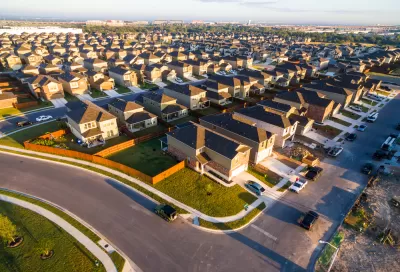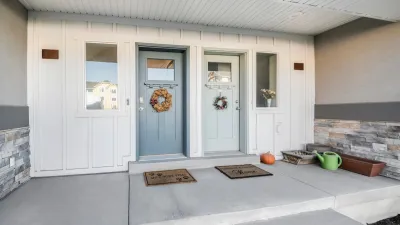As the housing crisis deepens, more Americans are saying housing affordability is a top concern in their community.

Almost half of Americans responding to a Pew Research Center survey in October 2021 say finding affordable housing in their community is a "major problem," reports Katherine Schaeffer. An additional 36 percent call affordable housing a "minor problem," while only 14 percent don't think it's a problem at all.
People in the West expressed the highest level of concern, with 69 percent calling affordable housing a major problem. Rural residents showed less concern than urban residents: 40 percent of rural respondents called housing a major problem, while 63 percent of urban dwellers worry about affordability. But some rural communities, like Colorado's mountain towns, are experiencing their own housing crisis as new residents drive up demand and costs.
Interestingly, the results also show partisan differences: 59 percent of left-leaning respondents called affordable housing a major problem, while only 36 percent of right-leaning respondents felt the same.
The survey reflects the steep rise in home prices and rents during the pandemic that are intensifying an existing housing crisis, particularly in major cities, where demand for housing outpaces available supply. Cities and states are scrambling to implement policies that stimulate housing production and encourage increased density in the hopes of relieving pressure on the overheated housing market.
FULL STORY: A growing share of Americans say affordable housing is a major problem where they live

Alabama: Trump Terminates Settlements for Black Communities Harmed By Raw Sewage
Trump deemed the landmark civil rights agreement “illegal DEI and environmental justice policy.”

Study: Maui’s Plan to Convert Vacation Rentals to Long-Term Housing Could Cause Nearly $1 Billion Economic Loss
The plan would reduce visitor accommodation by 25% resulting in 1,900 jobs lost.

Why Should We Subsidize Public Transportation?
Many public transit agencies face financial stress due to rising costs, declining fare revenue, and declining subsidies. Transit advocates must provide a strong business case for increasing public transit funding.

Wind Energy on the Rise Despite Federal Policy Reversal
The Trump administration is revoking federal support for renewable energy, but demand for new projects continues unabated.

Passengers Flock to Caltrain After Electrification
The new electric trains are running faster and more reliably, leading to strong ridership growth on the Bay Area rail system.

Texas Churches Rally Behind ‘Yes in God’s Back Yard’ Legislation
Religious leaders want the state to reduce zoning regulations to streamline leasing church-owned land to housing developers.
Urban Design for Planners 1: Software Tools
This six-course series explores essential urban design concepts using open source software and equips planners with the tools they need to participate fully in the urban design process.
Planning for Universal Design
Learn the tools for implementing Universal Design in planning regulations.
Caltrans
Smith Gee Studio
Institute for Housing and Urban Development Studies (IHS)
City of Grandview
Harvard GSD Executive Education
Toledo-Lucas County Plan Commissions
Salt Lake City
NYU Wagner Graduate School of Public Service





























